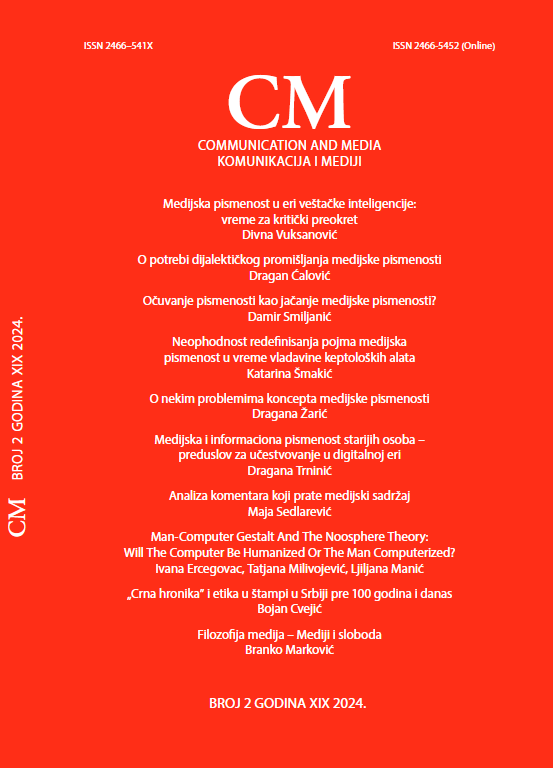Preserving Literacy Instead of Strenghtening Media Literacy?
Abstract
In today’s philosophical and scientific discourse on media, the concept of media literacy is increasingly mentioned. That term implies the art of effective use of new electronic media, which should also include a critical attitude towards them. ‘Media literacy’ thus becomes the fight slogan of a new critical thinking in the humanities. However, a closer examination of that term shows that it has its weaknesses: either it is tautologically conceived or the domain of its meaning is extended too much. The author starts from the position that the phenomenon of literacy is already elementary enough to be the subject of research in media philosophy and media science, because (extended) media literacy is also based on it. The starting point of a truly critical reflection on the media in today’s conditions should be the consideration of the reasons for the crisis of elementary (language) literacy. In support of his thesis, the author considers four aspects of that crisis – primacy of tactility, lack of attention, declining level of language culture and undifferentiated expression – and formulates the preservation of literacy in the sense of knowledge of language and the art of individual expression as a future task of philosophy and humanities.
Copyright
Authors retain copyright of the published papers and grant to the publisher the non-exclusive right to publish the article, to be cited as its original publisher in case of reuse, and to distribute it in all forms and media.
Licensing
The published articles will be distributed under the Creative Commons Attribution ShareAlike 4.0 International license (CC BY-SA). It is allowed to copy and redistribute the material in any medium or format, and remix, transform, and build upon it for any purpose, even commercially, as long as appropriate credit is given to the original author(s), a link to the license is provided, it is indicated if changes were made and the new work is distributed under the same license as the original.
Users are required to provide full bibliographic description of the original publication (authors, article title, journal title, volume, issue, pages), as well as its DOI code. In electronic publishing, users are also required to link the content with both the original article published in CM: Communication and Media and the licence used.
Authors are able to enter into separate, additional contractual arrangements for the non-exclusive distribution of the journal's published version of the work (e.g., post it to an institutional repository or publish it in a book), with an acknowledgement of its initial publication in this journal.
Self-archiving policy
Authors are permitted to deposit author’s publisher's version (PDF) of their work in an institutional repository, subject-based repository, author's personal website (including social networking sites, such as ResearchGate, Academia.edu, etc.), at any time after publication.
Full bibliographic information (authors, article title, journal title, volume, issue, pages) about the original publication must be provided and links must be made to the article's DOI and the license.
Disclaimer
The views expressed in the published works do not express the views of the Editors and the Editorial Staff. The authors take legal and moral responsibility for the ideas expressed in the articles. Publisher shall have no liability in the event of issuance of any claims for damages. The Publisher will not be held legally responsible should there be any claims for compensation.

